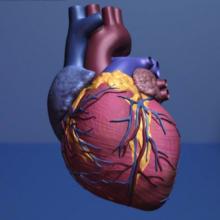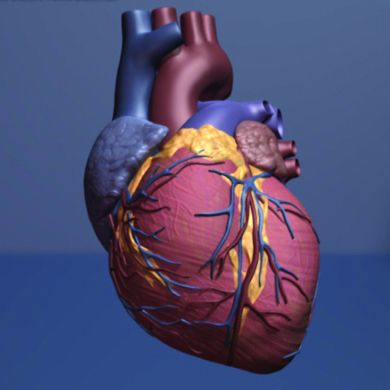User login
Among patients with adult congenital heart disease (ACHD), hepatitis C virus antibody positivity was significantly associated with a composite end point that comprised cardiac death, heart failure hospitalization, lethal ventricular arrhythmias, and cardiac reoperation, according to a report published online in the American Journal of Cardiology.
The study retrospectively enrolled 243 ACHD patients (mean age 26 years) who underwent cardiac surgery before 1992 and visited a single hospital during 1995-2015. Clinical characteristics, including cardiac function and long-term prognosis, were compared between HCV antibody–positive (48) and –negative (195) patients, according to Ryo Konno, MD, of Tohoku University, Sendai, Japan, and his colleagues.
They found that the prevalence of reduced systemic ventricular ejection fraction less than 50% was significantly higher in the HCV antibody–positive group than in the HCV antibody–negative group (17 vs. 5.4%; P = .014), and that during a mean follow-up of 10 years the composite end point occurred in 51 patients.
Overall, Kaplan-Meier analysis showed the HCV antibody–positive group had significantly poorer event-free survival than the HCV antibody–negative group (P = .002). In addition, HCV antibody positivity was significantly associated with the composite end point in both univariable and multivariable Cox regression models (hazard ratio, 2.37; P = .005 and HR, 1.96; P = .032, respectively).
“These results indicate that screening for HCV should be performed in all ACHD patients with a history of heart surgery before 1992. Further, cardiac functions should be monitored more frequently to detect [stroke volume] dysfunction earlier in case of a positive result. These management strategies may have a beneficial impact on the long-term prognosis in this population,” Dr. Konno and his colleagues concluded.
The research was supported by the Japan Agency for Medical Research and the authors had no conflicts of interest to disclose.
SOURCE: Konno R. et al. Am J Card. 2018;122:1965-71.
Among patients with adult congenital heart disease (ACHD), hepatitis C virus antibody positivity was significantly associated with a composite end point that comprised cardiac death, heart failure hospitalization, lethal ventricular arrhythmias, and cardiac reoperation, according to a report published online in the American Journal of Cardiology.
The study retrospectively enrolled 243 ACHD patients (mean age 26 years) who underwent cardiac surgery before 1992 and visited a single hospital during 1995-2015. Clinical characteristics, including cardiac function and long-term prognosis, were compared between HCV antibody–positive (48) and –negative (195) patients, according to Ryo Konno, MD, of Tohoku University, Sendai, Japan, and his colleagues.
They found that the prevalence of reduced systemic ventricular ejection fraction less than 50% was significantly higher in the HCV antibody–positive group than in the HCV antibody–negative group (17 vs. 5.4%; P = .014), and that during a mean follow-up of 10 years the composite end point occurred in 51 patients.
Overall, Kaplan-Meier analysis showed the HCV antibody–positive group had significantly poorer event-free survival than the HCV antibody–negative group (P = .002). In addition, HCV antibody positivity was significantly associated with the composite end point in both univariable and multivariable Cox regression models (hazard ratio, 2.37; P = .005 and HR, 1.96; P = .032, respectively).
“These results indicate that screening for HCV should be performed in all ACHD patients with a history of heart surgery before 1992. Further, cardiac functions should be monitored more frequently to detect [stroke volume] dysfunction earlier in case of a positive result. These management strategies may have a beneficial impact on the long-term prognosis in this population,” Dr. Konno and his colleagues concluded.
The research was supported by the Japan Agency for Medical Research and the authors had no conflicts of interest to disclose.
SOURCE: Konno R. et al. Am J Card. 2018;122:1965-71.
Among patients with adult congenital heart disease (ACHD), hepatitis C virus antibody positivity was significantly associated with a composite end point that comprised cardiac death, heart failure hospitalization, lethal ventricular arrhythmias, and cardiac reoperation, according to a report published online in the American Journal of Cardiology.
The study retrospectively enrolled 243 ACHD patients (mean age 26 years) who underwent cardiac surgery before 1992 and visited a single hospital during 1995-2015. Clinical characteristics, including cardiac function and long-term prognosis, were compared between HCV antibody–positive (48) and –negative (195) patients, according to Ryo Konno, MD, of Tohoku University, Sendai, Japan, and his colleagues.
They found that the prevalence of reduced systemic ventricular ejection fraction less than 50% was significantly higher in the HCV antibody–positive group than in the HCV antibody–negative group (17 vs. 5.4%; P = .014), and that during a mean follow-up of 10 years the composite end point occurred in 51 patients.
Overall, Kaplan-Meier analysis showed the HCV antibody–positive group had significantly poorer event-free survival than the HCV antibody–negative group (P = .002). In addition, HCV antibody positivity was significantly associated with the composite end point in both univariable and multivariable Cox regression models (hazard ratio, 2.37; P = .005 and HR, 1.96; P = .032, respectively).
“These results indicate that screening for HCV should be performed in all ACHD patients with a history of heart surgery before 1992. Further, cardiac functions should be monitored more frequently to detect [stroke volume] dysfunction earlier in case of a positive result. These management strategies may have a beneficial impact on the long-term prognosis in this population,” Dr. Konno and his colleagues concluded.
The research was supported by the Japan Agency for Medical Research and the authors had no conflicts of interest to disclose.
SOURCE: Konno R. et al. Am J Card. 2018;122:1965-71.
FROM THE AMERICAN JOURNAL OF CARDIOLOGY
Key clinical point: Adults with congenital heart disease and HCV antibody positivity had significantly worse cardiac outcomes than those without.
Major finding: The HCV antibody–positive group had significantly poorer event-free survival (P = .002).
Study details: A retrospective study of 243 ACHD patients; 48 had HCV antibody positivity.
Disclosures: The research was supported by the Japan Agency for Medical Research; the authors had no conflicts of interest to disclose.
Source: Konno R et al. Am J Card. 2018;122:1965-71.

